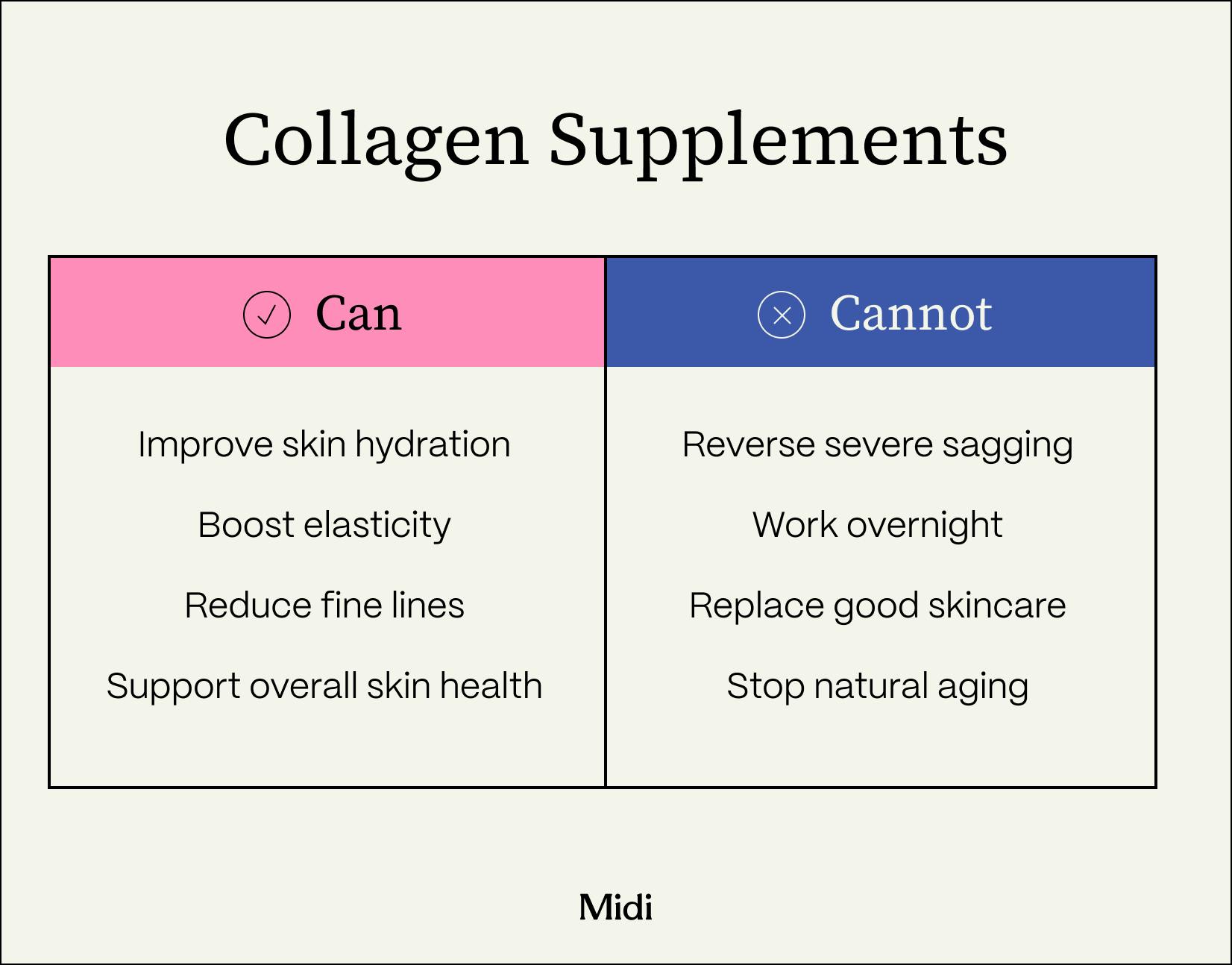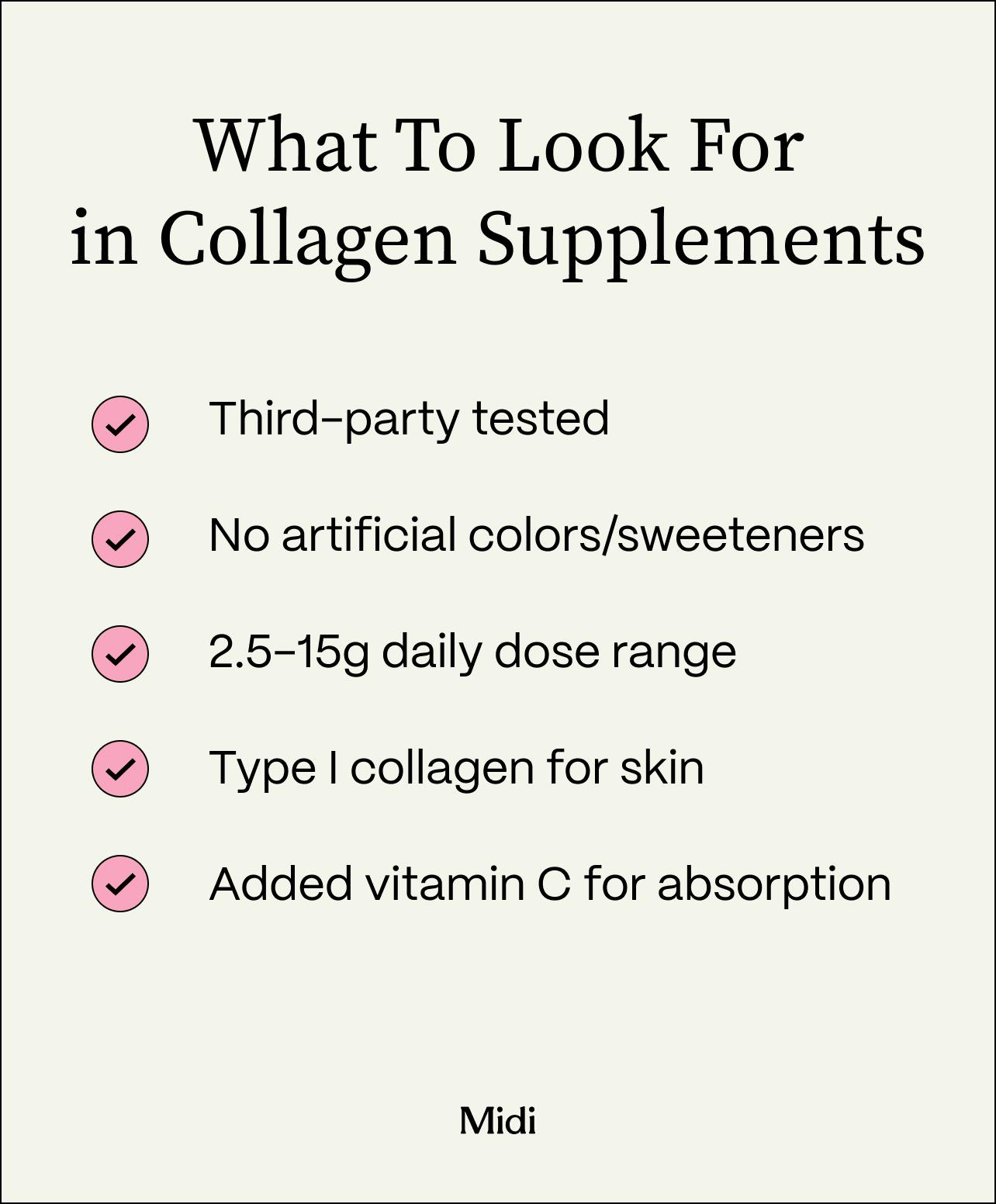First perimenopause made your skin dull, and now you're noticing it's sagging in ways it never did before. Before you start googling plastic surgeons in a panic, here's some good news: Collagen supplements can actually help improve your skin's hydration and elasticity during perimenopause and beyond. And Midi clinicians can help recommend and prescribe a range of options, including over-the-counter and prescription topical creams, to help boost the health of your skin.
If you've caught yourself on camera or in the mirror lately and thought, "Wait... did my [insert body part here—neck, arms, you name it!] always look like this?!"—we've got some news for you.
Your skin probably didn't always look like that. What you're seeing is just another delightful gift from perimenopause (because, apparently, it wasn't generous enough already).
This is all thanks to collagen, your skin's MVP protein that keeps things firm and bouncy. Here's where it gets interesting: Estrogen plays a huge role in collagen production, so as those hormone levels start their rollercoaster ride, your skin decides to join the party by becoming a little less... structured. Add in lifestyle factors like sun exposure or smoking, and by your 40s, the collagen decline is basically announcing itself everywhere.
That's probably why collagen supplements seem to be everywhere these days—from your Instagram feed to your dermatologist's office. And here's the exciting part: Studies actually back up the hype, to some extent. Research shows these supplements can make your skin look plumper and more hydrated, improve elasticity, and even help with wrinkles and skin texture.
So could collagen supplements be your secret weapon for maintaining that youthful glow? Let's dive in.
Benefits of Collagen Supplements for Skin Health
Think of collagen as your body's internal scaffolding—it's literally everywhere: skin, hair, nails, tendons, cartilage, and bones. Your body makes collagen using amino acids from protein-rich foods (hello, bone broth and salmon!), but here's the not-so-fun fact: We start losing about 1% of our collagen every year starting in our mid-20s. And studies show that collagen can decrease by as much as 30% in the 5 years following menopause.
The good news? Studies show that when you start supplementing with collagen, you can help your facial skin hold onto some of the hydration and elasticity that you remember from your younger years. And we're talking about the stuff you actually swallow here—powders, pills, and liquids that work from the inside out.

Types of Collagen Supplements
When it comes to collagen supplements, there are four key types:
- collagen powders
- collagen pills or capsules
- collagen liquids
- topical collagen
You might see terms like "collagen peptides" or "hydrolyzed collagen" thrown around—don't worry, it's just fancy terminology for basically the same thing. What really matters is collagen’s form and what else might be mixed in.
Choosing between these options often comes down to personal preference. If swallowing a handful of pills makes you gag, powder or liquid might be your best friend!
- Collagen powder is probably the form of collagen you’ve seen all over social media. It’s made by breaking down collagen from animals or fish into smaller peptides or amino acids, and it’s sold as collagen peptides or hydrolyzed collagen in the form of powder. You take it similarly to how you might take a protein powder—you can put a spoonful into any liquid, like water, coffee, or a smoothie, and mix it up until it’s dissolved. Studies have found that oral collagen can improve your skin’s elasticity and hydration, and collagen powders often also have some protein or other amino acids that may have tertiary health benefits.
- Collagen liquid is a flavored supplement made from the tissues of animals like cows, fish, and pigs, although you can also find vegan versions. This form of collagen can be taken on its own, with no need to mix it into any other food or drinks, and it’s often combined with a few other supplements, like biotin, hyaluronic acid, vitamin C, and zinc.
- Collagen pills are very similar to powders, except that the powder is contained in the pill capsule. This lets you take the collagen all at once, without having to mix it into something else. But collagen pills might require more effort—and money—than other forms: Some companies recommend six pills, twice per day, in order to get the recommended amount of collagen peptides.
Choosing the Best Collagen Supplement
First things first: Chat with your Midi Health clinician about what might work best for your lifestyle. And here's something important to know—just like hormone replacement therapy (HRT), collagen supplementation isn't a quick fix. Studies show the best results come from daily use for about 3 months, so you're in it for the long haul.
Once you’ve settled on whether you want your collagen in powder, liquid, or pill form, you have a few other factors to consider.
Type of collagen
Over 28 different forms of collagen exist in our bodies, but there are five main types:
- Type I: Type I collagen makes up 90% of your body’s collagen. It’s used to give your skin, bones, tendons, and ligaments structure.
- Type II: Type II collagen is found in your elastic cartilage, and it is especially important for your joints. Some studies have even found that collagen supplementation can have an effect on joint pain for people with osteoarthritis.
- Type III: Type III collagen is found in your muscles, organs, and arteries.
- Type IV: Type IV collagen is in layers of your skin
- Type V: Type V collagen can be found in your eyes, skin, and hair, as well as in the tissue of the placenta.
Source of collagen
Collagen supplements can be sourced from cows, pigs, or fish, and it can even be vegan (by using plant extracts instead). When considering a collagen supplement, you can ask yourself the same questions you might consider when you’re in the grocery store: Do you want amino acids from grass-fed cows? Do you want something entirely vegan? Your personal preferences can help you decide which supplement is best for you.
Additional ingredients
Some collagen supplements are made with other supplements, like vitamin C or biotin, to maximize the benefits. Others have additives or fillers. Read labels carefully, and avoid collagen supplements with artificial sweeteners or colors, as well as heavy metals.
Supplements aren’t required to be regulated by the FDA, so it’s even more important to pay close attention to the label. It’s especially important to be careful if you have a shellfish allergy, since some collagen supplements can contain a mix of bovine and marine collagen.
Third party testing
Since the FDA isn’t involved in the production of collagen supplements, ensuring that the company you choose has some third-party testing can help confirm that it doesn’t contain dangerous ingredients and that it’s safe for consumption.
You might find that a collagen supplement has been tested by the National Science Foundation, certified by the International GMO Evaluation Program, certified as kosher, or received other third-party certifications. Check labels closely for how a product is evaluated, and if you have questions, you can email the manufacturer (or discuss it with your Midi clinician).
True Stories Of Transformation
Other Ingredients to Pair with Collagen
If one of your biggest perimenopause gripes is the missing moisture and plumpness of your more youthful skin, focusing on some other ingredients can go a long way in benefiting your skin, hair, and nails.
While collagen supplements have been proven to improve your skin’s elasticity and hydration on their own, they’re often paired with other beauty-boosting ingredients, like:
- Vitamin C: This vitamin can also promote your body’s ability to produce collagen naturally, which can make it a helpful ingredient to add to your diet even without supplements. Vitamin C is also an antioxidant, which can help protect your skin cells from the environmental damage of the sun, pollution, and more.
- Hyaluronic acid: While collagen has been shown to boost hydration, hyaluronic acid is another ingredient known for its ability to have a moisturizing, plumping effect on your skin. Some topical collagen products have hyaluronic acid as an additional ingredient to help plump skin.
- Antioxidants: Vitamin E, vitamin C, ferulic acid, and other antioxidants can act as protectors to your skin. Studies have found that antioxidants can help disrupt the negative effects of toxins on our skin and promote the cell turnover that produces younger-looking skin with fewer wrinkles.

What to Know About Taking Collagen Supplements
So, if you’re going to get serious about taking collagen supplements, how exactly should you do it? First, you can always discuss a plan with your Midi clinician on the right dosage. Beyond that, know that studies suggest that effective amounts of functional collagen peptides range from 2.5 to 15 g daily.
And while some people prefer to take their collagen supplements in the morning with their coffee or protein shake or with a meal for absorption, there’s no data that proves that taking it at a particular time of day yields better results than any other.
What does matter: consistency. One study found that it took daily use for 3 months to see the benefits of collagen supplementation. So pick a routine you can stick with, because consistency is everything.
Can Collagen Have Other Benefits for Perimenopausal Women?
While younger-looking skin might be collagen's main claim to fame, it's got some other tricks up its sleeve. Studies have found that it can help with the symptoms of arthritis and even slow the progression of osteoarthritis and osteoporosis, especially in postmenopausal women. And since building muscle becomes increasingly important as we age, here's some bonus news: Some studies have shown that collagen can help with that, too.
Other Ways to Improve Your Skin’s Health in Perimenopause
Taking collagen supplements can be an easy way to boost your body’s collagen levels, but they can also be expensive.
When it comes to free (or almost free) ways to improve the hydration and elasticity of your skin, healthy habits can’t be beat: Eat lots of nutrient-dense foods, drink plenty of water to hydrate your cells, protect your skin with SPF when in the sun, quit smoking, and give your skin good hydration and antioxidants in the form of skin care.
Foods like bone broth, chicken, beef, and fish can all give your body collagen. Fresh berries, citrus, and leafy greens can support your body’s natural collagen production, thanks to their high vitamin C content.
Key Takeaways
- Collagen supplements can be a helpful way to boost your skin’s hydration and elasticity in perimenopause.
- Supplements come in powder, liquid, or capsule form, and choosing the right supplement for you is a matter of personal preference.
- Healthy habits like eating nutritious foods, drinking lots of water, and avoiding the sun can also help your skin in perimenopause.
- Discuss collagen supplements with your doctor or Midi clinician
Frequently Asked Questions (FAQs)
Which collagen is best for sagging skin?
Collagen supplements in powder, pill, or liquid form have all been proven to have positive effects on skin’s elasticity.
Can collagen reverse sagging skin?
While collagen can't turn back time completely, studies show it can significantly improve skin elasticity and hydration, giving you a more youthful appearance.
What is the best supplement to tighten loose skin?
Studies have found that collagen supplements can improve skin’s elasticity and hydration but the question, as always, is how much and whether you will truly see a difference.
Are there side effects of collagen supplements?
Collagen is generally considered safe, but it’s always important to discuss your personal health with your physician or a Midi Clinician before you add new supplements to your routine. Some common side effects might be digestive discomfort, headaches, or lightheadedness. If you have allergies to shellfish or eggs, check labels carefully to make sure that your supplements don’t include your allergens.
If you’re in perimenopause or menopause and want guidance from clinicians who specialize in women’s midlife health, book a virtual visit with Midi today.
Hormonal change is at the root of dozens of symptoms women experience in the years before and after their period stops.
Our trained menopause specialists can help you connect the dots to guide you towards safe, effective solutions.
Whether you need personalized guidance or a prescription routine to tackle symptoms—including vaginal dryness and irritation, brain fog, hot flashes, sleep trouble, mood swings, and weight gain—we’ve got you covered.
Midi’s mission is to revolutionize healthcare for women at midlife, wherever they live and whatever their health story. We believe that starts with education, to help all of us understand our always-changing bodies and health needs. Our core values guide everything we do, including standards that ensure the quality and trustworthiness of our content and editorial processes. We’re committed to providing information that is up-to-date, accurate, and relies on evidence-based research and peer-reviewed journals. For more details on our editorial process, see here.






